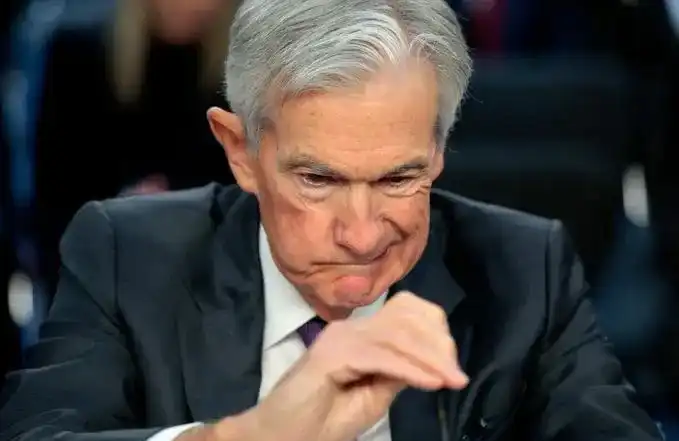If President Trump Fires Fed's Powell, What Would Happen to the Markets?
Powell did not signal a rate cut at yesterday's event at the Chicago Economic Club. The most anxious person, no doubt, is Trump.
The President, after a month-long tariff turmoil, was apparently furious about the Fed's decision not to cut rates, launching a series of attacks on Powell: "If I wanted to, I'd fire Fed Chair Powell. I'm not happy with him. I don't think he's doing a good job." "Powell is slow to act, slow to react." "Powell is playing politics; rates should be lower now." "The people at the Fed are not smart; Powell is doing a terrible job." Powell is "not someone I've ever liked." Powell, on the other hand, staunchly defended the Fed's independence, rebutted political interference, and stated that the Fed would make decisions based solely on what is best for the American people.

Trump Challenges Fed's Independence
Trump has never hidden his disappointment with Powell. On April 17, 2025, he told reporters in the Oval Office, "Trust me, if I wanted him gone, he'd be gone in a heartbeat!" He then posted on Truth Social urging Fed Chair Powell to cut rates, "The ECB is about to cut for the seventh time, while the Fed's 'forever late' Mr. Powell has once again messed everything up. Yesterday he put out a typical messed up report - oil prices are falling, food prices are dropping, even eggs are cheaper, and the U.S. is making a killing through tariffs. This 'slowpoke' should have cut rates like the ECB ages ago; now is even more urgent, and Powell's countdown to leaving should be accelerated!"

Trump's anger largely stems from Powell's "conservative" stance on monetary policy. He believes that Powell has failed to significantly cut rates in a timely manner, missing the window to stimulate economic growth. What further displeases Trump is that the Fed's high rate policy clashes with his tariff agenda implemented after taking office. Trump's tariff policy aims to protect U.S. domestic industries but may raise prices of imported goods, thereby exacerbating inflationary pressures. The Yale Budget Lab estimates that these tariffs are equivalent to an additional $4,900 in real taxes for each U.S. household. In this context, Trump hopes the Fed will relieve economic pressure through rate cuts to support his policies.
As for whether Trump wants to fire Powell, although he publicly told reporters that he "regrets nominating Powell," clues may be gleaned from a WSJ report. Sources said Trump had privately discussed replacing Powell with former Fed Governor Kevin Warsh.
What Are the Obstacles to Dismissing Powell?
Can Trump really "fire" Powell as he wishes? The answer is not simple.
According to the Federal Reserve Act, the Fed Chair and Board members can only be dismissed "for cause," which usually refers to misconduct, malfeasance, or incapacity, rather than policy disagreements. In history, no Fed Chair has ever been directly removed by a President, and this legal framework provides a solid protection for the Fed's independence. Powell himself is clear on this. In November 2024, when asked if he would resign if Trump asked him to, he emphatically replied, "No."
Furthermore, Powell's term also provides him with protection. He was initially nominated by Trump to serve as Fed Chair in 2017, re-nominated by Biden in 2022, and his term as chair will last until May 2026. Brookings Senior Fellow Sarah Binder pointed out that courts usually do not view dissent on interest rate setting as a "just cause," so if Trump were to forcefully dismiss Powell, he might face legal challenges.
Even if the law allows it, dismissing Powell would also be politically risky. The Fed's independence is not just a legal issue but the cornerstone of market confidence. Binder warned that a President's attempt to remove Powell would increase market uncertainty, shake the public's trust in the Fed, potentially leading to significant volatility in the stock and bond markets, and even affecting the cryptocurrency market. After all, despite touting "decentralization," cryptocurrency prices are still heavily influenced by the macroeconomic environment and investor sentiment.
Trump's aggressive stance has even raised concerns among some who criticize Powell. Senior Democratic Senator Warren stated that undermining the Fed's independence could trigger a market collapse.

While there are two "protective shields" from the law and the market, it does not mean that Powell's position is not under threat. The U.S. Supreme Court is currently reviewing a case involving the President's power to dismiss senior officials in independent agencies. Although the case targets not the Fed but the National Labor Relations Board and the Consumer Financial Protection Bureau, the ruling could provide a legal basis for Trump. While the 1935 "Humphrey's Executor v. United States" case established a precedent limiting the President's ability to dismiss independent agency heads without cause, the current conservative Supreme Court may revisit this ruling. If the Court tends to expand presidential powers, Powell's position could indeed be in jeopardy.
Furthermore, Powell's support is not unshakeable. Compared to Trump's first term, Powell now faces more scrutiny. Some believe that the Fed's actions to combat inflation in 2022-2023 were too slow, leading to policy errors. Allies within the White House believe that Trump's tweet on Thursday morning was more an attempt to disrupt Powell's stance and portray him as the future "scapegoat for economic issues," potentially weakening his public support and increasing the risk of being replaced.
How Will It Impact the Crypto Market?
Perhaps firing Powell isn't the key move here, as for Trump, this seems to be a push for the Fed to "open the floodgates" and stimulate economic growth through aggressive rate cuts.
Rate cuts typically mean increased liquidity, a decreased purchasing power of the dollar, and rising inflation expectations. In this environment, cryptocurrency, especially Bitcoin, known as "digital gold," can attract inflows. Looking back at 2020, the Fed cut rates to near zero in response to the pandemic, and the price of Bitcoin surged from under $10,000 to $67,000 by the end of 2021, hitting an all-time high. A similar scenario may unfold under Trump's rate-cutting pressure.

Furthermore, Trump's tariff policy could further drive up inflation. According to Powell's warning, tariffs could lead to higher prices for imported goods, squeezing household budgets, and driving up prices. Yale University estimates that the inflationary effect of tariffs is equivalent to a $4,900 increase in the real tax burden for each household. Under inflationary pressure, investors may shift funds to mainstream currencies like Bitcoin or even chase high-risk altcoins, sparking a bull market frenzy.
Looking further ahead, if the Fed loses its independence due to political pressure, the credibility of US monetary policy may be compromised. DeFi and blockchain technology serve as supplements to the traditional financial system's shortcomings. If the Fed becomes politicized, it could accelerate investor disillusionment with the dollar system, driving funds into ecosystems like DeFi.
However, rate cuts are not a cure-all. Powell warned in yesterday's speech at the Economic Club of Chicago that Trump's tariff policy could push the US economy into a "stagflation" dilemma—high inflation alongside slowing economic growth. This environment would make the Fed's dual mandate (price stability and maximizing employment) exceptionally complex.
In a stagflation environment, the Fed may face a dilemma: cutting rates to stimulate the economy could exacerbate inflation, while maintaining high rates could suppress growth. For the cryptocurrency market, this means sharp price fluctuations.
This Trump vs. Powell game may ultimately evolve into an exhausting stalemate with no winner, where market confidence and economic stability are the casualties. History tells us that the cost of political intervention is often paid for by the wallets of ordinary investors and supermarket bills.
Welcome to join the official BlockBeats community:
Telegram Subscription Group: https://t.me/theblockbeats
Telegram Discussion Group: https://t.me/BlockBeats_App
Official Twitter Account: https://twitter.com/BlockBeatsAsia


 Forum
Forum OPRR
OPRR Finance
Finance
 Specials
Specials
 On-chain Eco
On-chain Eco
 Entry
Entry
 Podcasts
Podcasts
 Data
Data


 Summarized by AI
Summarized by AI





